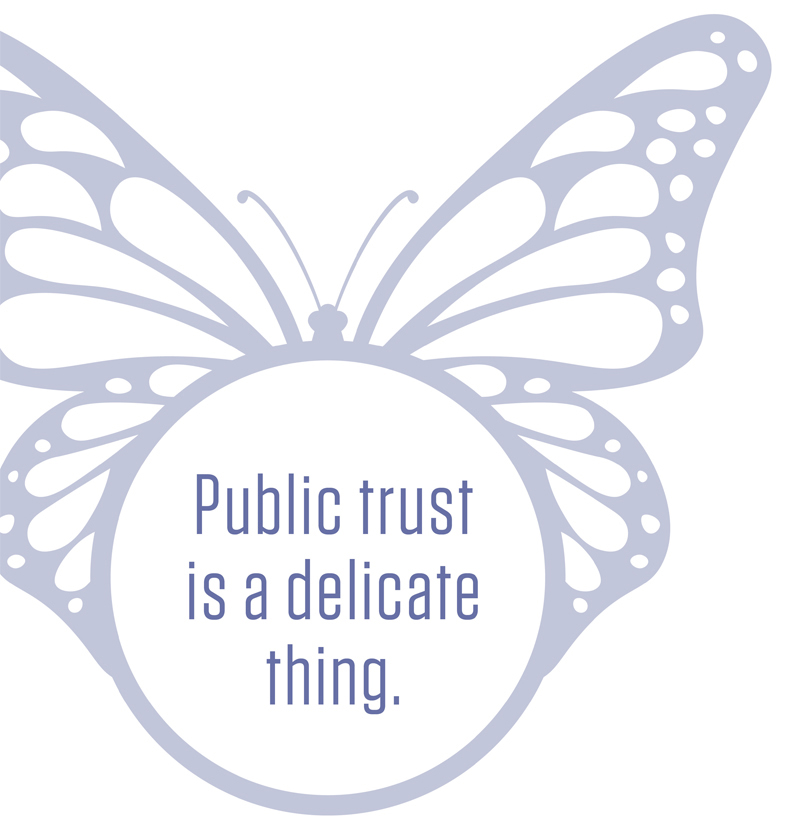Maintaining the public’s trust is paramount to the profession’s self-regulation
By Brian Jackson
I’ll never forget the day I first learned about the American Academy of Actuaries and the actuarial profession. It was in November 2011. At the time, I was a Marine Corps judge advocate (also known as a Marine lawyer) who was having great difficulty meeting the Marine Corps’ exacting physical fitness standards. I couldn’t navigate the Marine Corps’ diabolical obstacle course like I used to, and I was getting to the point where they could use a sundial to time my 3-mile runs! My knees, my hips, and my age were all conspiring against me. After 22 very satisfying years of service, it was time for me to go—I had to retire.
But what would I do next? As an attorney, I hated the prospect of having to spend the rest of my professional career weaving stories that are false out of statements that are true. You see, the Marine Corps spoiled me. I had become used to being a part of an organization where honor, courage, integrity, and commitment were not just words but heartfelt convictions that actually framed how Marines live and act. I needed to find another organization with a strong sense of purpose and a clear set of values and standards that guides its members. But where could I find another job like that?
Then I saw that the Academy was looking for a qualified attorney to serve as counsel for the Actuarial Board for Counseling and Discipline (ABCD), and I knew that I had found my next professional home. When I looked into the position, I learned about the five U.S.-based actuarial organizations—I call them “the five families”—and the way each organization serves the profession. I also learned that within the insurance industry, the actuary frequently has a dual role: an objective professional who helps to assure the public that their principal is complying with insurance regulations that preserve the financial integrity of the insurance system, and a business manager who promotes the goals and financial objectives of their principal.
So, I was floored when I discovered that the U.S. actuarial profession substantially self-regulates its members’ ethical and practice standards in the development and delivery of work products and actuarial opinions.[1] Of course, actuaries work under many regulatory requirements—laws and regulations—but the U.S. profession itself is self-regulated, for the most part. How could that be? Isn’t that a bit like putting the fox in charge of the henhouse?
How is it that actuaries are trusted to support the solvency of and the public trust in pension programs, insurance systems, and other financial products while remaining independent from undue state and federal influence?
After getting the job and eventually becoming the Academy’s senior director of professionalism, I believe I now know the answer—it’s the Code of Professional Conduct (“Code”) and the steadfast dedication of every credentialed actuary to meet the Code’s high standards of competence, integrity, objectivity, and a commitment to service.
The public delegates self-regulation authority to the U.S. actuarial profession because it trusts that the profession is capable of putting aside the self-interest of its members and regulating the profession in the public interest.
But public trust is a delicate thing.
We have witnessed professions lose their self-regulation powers or have them whittled down to such a degree that they are almost nonexistent after the public lost confidence in the ability or willingness of that profession to protect the public interest. In self-regulating environments like ours—where the responsibility for creating standards of conduct, practice, and qualification (and monitoring and enforcing these standards)—lies within the profession itself, the consequences of losing the public’s trust can be severe and far-reaching. For example, in 2006, after more than a century of self-regulation, the United Kingdom’s actuarial profession agreed that its regulatory responsibilities would be subject to external oversight through the U.K.’s Financial Reporting Council (FRC) after public outrage over the near collapse of Equitable Life, the oldest mutual life insurance company in the world. In addition, the U.K. actuarial profession agreed that members of the Institute of Actuaries and of the Faculty of Actuaries[2] in the U.K. would be required to follow Technical Actuarial Standards written by a new FRC operating body and that disciplinary matters that raise significant public interest concerns would be dealt with by another of the FRC’s operating bodies.[3]
What happened in the U.K. could certainly happen in the U.S. if our actuaries fail to remember that the actuarial profession serves at the pleasure of the public and owes their privilege to practice to the willingness of others to trust in their expertise and integrity.
When speaking about professionalism to actuarial clubs and organizations, I always stress the importance of following the Code and how actuaries practicing in the U.S. fulfill their responsibility to the public by meeting the Code’s high standards of conduct, practice, and qualification while serving their principals. But what I don’t often say is that the Code cannot possibly address specific situations or provide magical solutions to the sticky ethical issues practicing actuaries regularly face—it is not always easy to know right from wrong. To maintain the public’s trust in the profession, the prudent actuary will not only exercise good professional judgment when applying the Code to their day-to-day conduct, they will use the principles set forth in the Code to develop their own moral compass to assist them when making decisions that might impact their reputation and that of the profession. To this end, I thought it might be helpful to discuss a few guiding principles that spring from Precept 1 (my favorite Precept!) in the hope that these principles may assist you in doing your part to support and maintain the U.S. profession’s great reputation and self-regulation.
Principle 1—Act with honesty
Be honest. Tell the truth. Do not distort or amplify the truth. Do not deceive yourself or others. Obviously, that means you must not intentionally misstate liability calculations, deliberately understate trend assumptions, or fraudulently overcharge clients. But simply refraining from such obviously dishonest behavior is not enough. Precept 1 also has an ethical component that implies that the credentialed actuary should be trustworthy, loyal, fair, open, and sincere at all times—even if alternative courses of action would better please a principal.
The commitment to honesty imposed by Precept 1 obligates you to understand the truth—as best you can—and act in a truthful manner in your communications and in your conduct. In my opinion, the trustworthy actuary is the actuary who can provide professional services objectively. And objectivity requires intellectual honesty. Regardless of the particular service rendered or the capacity in which an actuary functions, actuaries should strive to protect the honesty of their work, maintain objectivity, and avoid subordination of their judgment.
Principle 2—Act with integrity
Personal integrity is the No. 1 professionalism trait expected of actuaries, and it is the most important trait for actuaries to show. Integrity refers to your moral compass, your sense of honor, of right and wrong. Integrity demands honesty and candor, which must not be subordinated to personal gain and advantage. Everything else you are as an actuary hinges on your integrity, for it doesn’t matter how much you know or what experience you have if you lack integrity and cannot be trusted.
Principle 3—Act with competence
Through Precept 1, the actuary has a public responsibility to perform actuarial services with skill and care. To do that, the actuary must only perform actuarial services when the actuary is qualified to do so on the basis of basic and continuing education, experience, and relevant qualification standards. But that is just the letter of the standard (fully articulated in Precept 2). In my opinion, in order to provide professional services with skill and care, the actuary should be comfortable with their qualifications and ability to perform the assignment in question. This includes not only satisfying the qualification standards but also being able to look yourself in the mirror and objectively confirm that you have the relevant continuing education and experience to do the job competently.
Most of the cases that come before the ABCD don’t involve dishonesty, fraud, intent to deceive, or lack of integrity on the part of practicing actuaries. Nor do many ABCD inquiries involve an actuary failing to resist inappropriate pressure from a principal to modify actuarial opinions. (It is more common, in fact, for the ABCD to see such situations in their request-for-guidance activities, where actuaries are resisting inappropriate pressure and are seeking support for their decision to do so.) Instead, most ABCD inquiries involve work products that are deficient because of a lack of skill and care. Serving your principal with skill and care includes the basics, such as:
- Reviewing applicable actuarial standards of practice, as well as other useful and relevant professional literature before beginning an assignment.
- Using appropriate assumptions, data, methods, and tests for reasonableness and disclosing them with sufficient clarity that another qualified actuary in the same practice area can make an objective appraisal of the reasonableness of the work.
- Taking steps to ensure that actuarial communications are clear and appropriate, and including appropriate disclaimer language so that the principal understands the significance of the actuarial work and its limitations.
- Avoiding careless errors by checking and rechecking your work product or having peers review your work.
- Remaining current on emerging advancements in actuarial practice that are relevant to the actuarial services you provide.
- Never letting technology substitute for the exercise of reasoned professional judgment.
Principle 4—Act in a manner that upholds the actuarial profession’s reputation
You fulfill your individual responsibility to the public and to the actuarial profession by upholding the values and standards of the profession, fulfilling statutory roles, and avoiding conduct that could bring the profession into disrepute. Of course, one way to fail to meet this obligation is to provide actuarial services to a principal that you have reason to believe may use your professional services to violate or evade the law.
But avoiding conduct detrimental to actuarial reputation and upholding the values and standards of the profession involves more than simply following standards of practice and refusing to serve your principal as a co-conspirator. As a credentialed actuary, you must have regard for your professional standing at all times, even when you are not acting as an actuary. You are obligated to refrain from conduct—any conduct—that fails to uphold the reputation of the profession. The public’s trust and confidence in the actuarial profession (and the reputation of the profession generally) can be undermined by an actuary’s personal conduct that reflects adversely on the actuarial profession or on that actuary’s trustworthiness and fitness as an actuary. Every credentialed actuary has an individual responsibility to enhance the profession’s reputation and refrain from doing anything that might harm the reputation of the actuarial profession.
But Precept 1 expects even more from you—upholding the reputation of the profession also requires you to act based on another actuary’s behavior if you have knowledge that that actuary engaged in an apparent, unresolved, material violation of the Code.[4] Self-regulation requires the profession to monitor compliance of its standards and counsel or discipline those who fail to meet them. The ABCD does an outstanding job in investigating, counseling, and recommending discipline (when appropriate)—but the ABCD is not a police force, and its members do not walk the streets peeking into windows looking for material violations of our standards. That is your job. You are the “cop on the beat” who has access to work product or conduct that may not meet the profession’s standards of professionalism and excellence. Through Precept 13, you have an individual responsibility to either resolve an apparent violation that you have knowledge of or report that violation to the ABCD. “The key takeaway is that an actuary has a professional obligation not to turn a blind eye, a deaf ear, or a mute tongue to an apparent material violation of the Code.”[5] Quite frankly, our self-regulating processes will fail if you fail to meet this important obligation to your profession.
Now that I’ve been at the Academy for over 12 years, I couldn’t be prouder of my affiliation with another profession comprised of trusted professionals who voluntarily commit to live by a set of core values that guide how its members will conduct their everyday business. Acting with honesty, integrity, competence, and doing the right thing are the driving forces behind the actuarial profession’s success in remaining a mostly self-regulated profession for decades. My hope is that every actuary reading this will take some time out of their day to reflect on that and think about what they can do to live the ethical principles set forth in in Precept 1—for these principles are the building blocks that will aid you in making the right decisions at the right time. The trust, standing, and reputation of the actuarial profession depend on the judgment and conduct of each individual actuary, and the rigor with which actuaries bring honesty, integrity, and competence to their actions.
I wish you well in your professional career, and I applaud your commitment to live up to the high standards of the actuarial profession.
BRIAN JACKSON, J.D., is senior director of professionalism for the Academy.
Endnotes
1. Enrolled actuaries are the only U.S. actuaries subject to direct government regulation, through the Joint Board for the Enrollment of Actuaries (Joint Board).
2. The Institute and Faculty of Actuaries (IFoA) came into being in August 2010 as a result of the merger of the Institute of Actuaries and the Faculty of Actuaries after voting members of both bodies voted to merge their respective organizations in in May 2010.
3. “Restoring trust in audit and corporate governance”; The UK Department for Business, Energy and Industrial Strategy; March 2021.
4. See Precept 13.
5. “Professionalism in Action—Talking the Talk: Professionalism and Actuary-to-Actuary Communications” Contingencies; May/June 2017.







